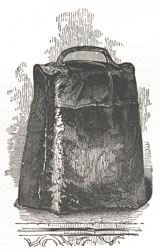St. Patrick’s Prayer for Ireland
One prayer uttered by St. Patrick has been singularly fulfilled.
“May my Lord grant,” he exclaims, “that I may never lose His people, which He has acquired in the ends of the earth!”
From hill and dale, from camp and cottage, from plebeian and noble, there rang out a grand “Amen.”
The strain was caught by Secundinus and Benignus, by Columba and Columbanus, by Brigid and Brendan.
It floated away from Lindisfarne and Iona, to Iceland and Tarentum.
It was heard on the sunny banks of the Rhine, at Antwerp and Cologne, in Oxford, in Pavia, and in Paris.
And still the old echo is breathing its holy prayer.
By the priest, who toils in cold and storm to the “station” on the mountain side, far from his humble home.
By the confessor, who spends hour after hour, in the heat of summer and the cold of winter, absolving the penitent children of Patrick.
By the monk in his cloister.
By noble and true-hearted men, faithful through centuries of persecution.
And loudly and nobly, though it be but faint to human ears, is that echo uttered also by the aged woman who lies down by the wayside to die in the famine years,[8] because she prefers the bread of heaven to the bread of earth, and the faith taught by Patrick to the tempter’s gold.
By the emigrant, who, with broken heart bids a long farewell to the dear island home, to the old father, to the grey-haired mother, because his adherence to his faith tends not to further his temporal interest, and he must starve or go beyond the sea for bread.
Thus ever and ever that echo is gushing up into the ear of God, and never will it cease until it shall have merged into the eternal alleluia which the often-martyred and ever-faithful children of the saint shall shout with him in rapturous voice before the Eternal Throne.

St. Patrick’s Bell
Notes
[8] Famine years.—During the famous, or rather infamous, Partry evictions, an old man of eighty and a woman of seventy-four were amongst the number of those who suffered for their ancient faith. They were driven from the home which their parents and grandfathers had occupied, in a pitiless storm of sleet and snow. The aged woman utters some slight complaint; but her noble-hearted aged husband consoles her with this answer: “The sufferings and death of Jesus Christ were bitterer still.” Sixty-nine souls were cast out of doors that day. Well might the Times say: “These evictions are a hideous scandal; and the bishop should rather die than be guilty of such a crime.” Yet, who can count up all the evictions, massacres, tortures, and punishments which this people has endured?
